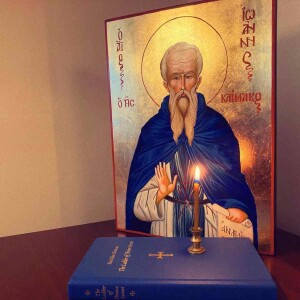Tonight we resumed our reading of Step One on the Renunciation of the world. The step fits into the larger context of a break with the world which includes, John tells us, detachment and exile. Here is where monks sought to remove everything from their lives that would keep them from focusing solely upon God and what He alone offers. As Christians we may not imitate the monk in living in the desert; yet, in reality, the desert exists within the human heart. The renunciation that John speaks of in this first step must exist within us as well. There are many ways that we have to let go of the things that hold us within their grip; the passions (sins that have become habitual), disordered desires that make us long for satisfaction and seek it within worldly goods and the fulfillment of the appetites.
In paragraph 4, John begins to define for us the various types of Christians. He does this not as an abstraction but rather as a frame through which we can view our lives. He paints with broad strokes and asks us to gaze deeply into the image to see if we recognize a reflection of ourselves. Are we an irreligious man (not thinking of God at all), a transgressor who distorts the faith in a depraved fashion? Are we a Christian who seeks to imitate Christ in word, thought, and deed - who believes in what God has revealed of himself to us; namely, believing in the Holy Trinity? Are we the lover of God who seeks to live in communion with all that is natural and sinless? Are we the continent man, who in the face of temptations and turmoil, struggles in order that he might be free? Have we interiorized monasticism in the sense that we seek a chaste love, purity of heart and mind? Do we remember death so as to cling to He alone who is our life? Have we set aside the things of this world voluntarily; not because they are evil but because we are a naturally attached to them more than we are attached to the love of God?
---
Text of chat during the group:
00:34:39 Anthony: We are tied to an evolutionary metaphysic - to our detriment.
00:35:13 Anthony: "We" being society, even Christian society adopt evolutionary "becoming'
00:36:54 Eric Williams: I think Thomas à Kempis made a good effort to remind Western scholastics of the bigger picture.
00:38:18 Ambrose Little: Some people are more intellectually inclined, and God can use that to draw people to himself.
00:39:20 Joseph Caro: good point Ambrose! I agree, from my own observations
00:39:21 Edward Kleinguetl: To be fair, Aidan Nichols--who I referenced-- is a Dominican.
00:39:34 Ambrose Little: Fr. Garrigou-La Grange, O.P. is great. Highly recommend: Christian Perfection and Contemplation: According to St. Thomas Aquinas and St. John of the Cross https://amzn.to/3JlEwrP
00:39:57 sue and mark: God will and can use who ever a
00:40:05 Fr. Miron Jr.: Let's return to Climacus
00:40:12 sue and mark: whoever and where eer you are to bring you to himself
00:40:57 Carmen Briceno: aren’t we doing the same thing now? over intellectualizing what has happened rather than going back to the sources?
00:58:23 Joseph Caro: “It is a mistake,” says St. John Chrysostom, “to imagine that one can in one’s own strength vanquish concupiscence and preserve purity; by God’s mercy alone can the passions of nature be controlled.”
01:02:58 Bonnie Lewis: This humility will reveal great truths about ourselves.
01:03:08 Mitchell Hunt: Where was that quote from above nothingness and humility? Amazing
01:03:14 Mitchell Hunt: About
01:07:34 Ren: @MitchellHunt - Mother Mectilde de Bar’s “Breviary of Fire.” The chapter on Pride and Humility
01:10:45 Erick: this is pure gold. each sentence of this is an outline of the spiritual life
01:11:19 Anthony: It takes experience in the world to see the trials and sorrow which result from the Curse, and we really then long to be free and to live in accordance with our nature (created and "deified").
01:13:49 Cathy: We can not have 2 gods... We will despise one
01:18:37 Mitchell Hunt: Thank you Ren
01:18:40 Eric Williams: Material comforts are like agglomerations attached to us. As they increase in number, they add to our “mass”, and as mass increases so does gravitational attraction. The more things we amass, the more we draw toward ourselves. With a little more thought one might find an interesting metaphor to be made from the accumulation of accretions becoming so great that a black hole is formed.
01:20:17 Anthony: God is the "Philanthropic One." Beautiful title.
01:22:45 Sean McCune: Eric: We become a nothingness that pulls everything in our grasp to ourselves where they are also become nothingness.
01:25:09 Sean McCune: (It took your comment about material things to get this secular Franciscan to say something) 😏
01:26:40 victoriaschweitzer: Righto. We must receive. We cannot approach with the mindset that we have to accumulate spiritual goodies. Ask and you shall receive.
01:28:21 Eric Williams: Indeed, Sean. The funny thing about massive bodies is that they interact with others. Either we enter into harmonious orbits or equilibria with other persons, or we are rogue bodies that collide with others or gravitational abysses that absorb and destroy all that falls within our sphere of influence. (Have I beaten this metaphor to death yet? 😉)
01:29:14 Mitchell Hunt: I think some people have have missed tonight due to your time zone change recently. Got me on Monday night

2 years ago
Thank you Fr. It helps.